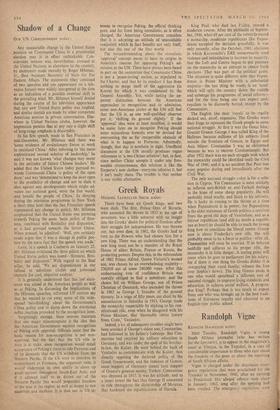Shadow of a Change
OUR UN CORRESPONDENT writes :
Any measurable change in the United States position on Communist China in a presidential election year is in effect unthinkable. Con- siderable interest was, nevertheless, aroused -at the United Nations, as elsewhere in the country, by statements made recently by Roger Hilsman, Jr., then Assistant Secretary of State for Far Eastern Affairs. The statements (they consisted of two speeches and one appearance on a tele- vision forum) were widely interpreted at the time as an indication of a possible eventual shift in the prevailing wind. Mr. Hilsman himself denied during the course of his television appearance that any new United States policy was implied, and similar denials are made by other competent American sources in private conversation. Else- where in United Nations circles, however, the impression persists that at any rate a slight shift of long-range emphasis is discernible.
In his first speech, made in San Francisco in mid-December, Mr. Hilsman said there was 'some evidence of evolutionary forces at work in mainland China.' After referring to 'the more sophisticated second echelon of leadership,' he said it was not known 'what changes may occur in the attitudes of future Chinese leaders.' He added that the United States today pursued to- wards Communist China 'a policy of the open door,' and was 'determined to keep the door open to the possibility of change and not to slam it shut against any developments which might ad- vance our national good, serve the free world, and benefit the people of China.' In denying during the television programme in New York a short time later that the San Francisco speech represented any change in policy, Mr. Hilsman emphasised that the United States was pursuing towards Peking the same 'basic policy of firm- ness, combined with flexibility and dispassion,' as it had pursued towards the Soviet Union. When pressed, he admitted: 'Well, you certainly could argue that it was a change in public pos- ture by the mere fact that the speech was made.'
Later, in a speech in Canberra on January 25, Mr. Hilsman reiterated the three pillars on which United States policy was based—'firmness, flexi- bility and dispassion.' With regard to the final pillar, he said, 'We are dispassionate in our refusal to substitute clichds and polemical rhetoric for cool, objective analysis.'
It is generally understood that this last state- ment was aimed at the American people as well as at Peking. In discussing the implications of the Hilsman speeches, informed US sources say that he wanted to cut away some of the wide- spread `mis-thinking' about the Government's China policy and to damp down the emotional reflex reaction provoked by the recognition issue.
Surprisingly enough, these sources maintain that one major misconception is the idea that the American Government equates recognition of Peking with approval. Officials insist that the basic reason for non-recognition is not non- approval, but the fact that the US role in Asia is at stake, since recognition would entail acceptance of Peking's claini to rule Formosa and of its demands that the US withdraw from the Western Pacific. If the US were to abandon its commitment to Formosa, the argument runs, it would undermine its own ability to shore up small nations throughout South-East Asia; and if it allowed itself to be driven out of the Western Pacific this would jeopardise freedom of the seas in the region, as well as access to raw materials and markets. It is thus not in US in-
terests to recognise Peking, the official thinking goes, and far from being unrealistic, as is often charged, the American Government considers that it is adopting an attitude of unassailable realpolitik which in fact benefits not only itself, but also the rest of the free world.
The misunderstanding about the moralistic 'approval' concept seems to have its origins in America's reasons for opposing Peking's ad- mission to the UN. These have always been based in part on the contention that Communist China is not a 'peace-loving' nation, as stipulated in the Charter, and that by its conduct it has done nothing to purge itself of the aggression (in Korea) for which it was condemned by the General Assembly. Yet, while noting the ap- parent distinction between the American approaches to recognition and to admission, some non-American circles at the UN still feel that the US is, as one well-qualified observer put it, 'shifting its ground slightly.' If the 'approval' idea were at least modified, it would be easier later on to recognise Peking should some miraculous formula ever be devised for overcoming the so far insuperable obstacle of what is to happen to Formosa. Admittedly, though, that day is nowhere in sight. Unofficial discussion at the UN usually produces vague references to 'a two-Chinas solution'; but, in fact, since neither China accepts it under any fore- seeable circumstances, this solution is like the Emperor's new clothes—everyone admires it, but it isn't really there. The trouble is that neither is any visible alternative.


































 Previous page
Previous page